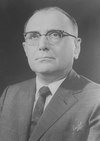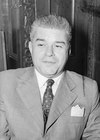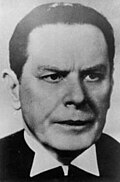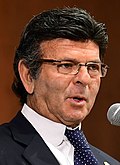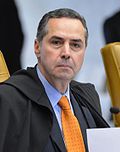| No. | Portrait | Justice | Took office | Left office | Time in office | Appointer |
|---|
| 1 | | Freitas Henriques
(1822–1903) | 28 February 1891 (1891-02-28) | 9 February 1894 (1894-02-09) | 2 years, 346 days | Deodoro da Fonseca (Ind) |
| 2 | | Aquino e Castro
(1828–1906) | 28 February 1894 (1894-02-28) | 10 August 1906 (1906-08-10) | 12 years, 163 days | Deodoro da Fonseca (Ind) |
| 3 | | Piza e Almeida
(1842–1908) | 18 August 1906 (1906-08-18) | 22 April 1908 (1908-04-22) | 1 year, 248 days | Deodoro da Fonseca (Ind) |
| 4 | | Pindaíba de Matos
(1831–1913) | 29 April 1908 (1908-04-29) | 26 December 1910 (1910-12-26) | 2 years, 241 days | Floriano Peixoto (Ind) |
| 5 | | Hermínio do Espírito Santo
(1842–1924) | 4 January 1911 (1911-01-04) | 11 November 1924 (1924-11-11) | 13 years, 312 days | Floriano Peixoto (Ind) |
| 6 | | André Cavalcanti
(1834–1927) | 14 November 1924 (1924-11-14) | 13 February 1927 (1927-02-13) | 2 years, 91 days | Prudente de Morais (PR Federal) |
| 7 | | Godofredo Cunha
(1860–1936) | 22 February 1927 (1927-02-22) | 17 February 1931 (1931-02-17) | 3 years, 360 days | Nilo Peçanha (PRF) |
| 8 | | Leoni Ramos
(1857–1931) | 25 February 1931 (1931-02-25) | 20 March 1931 (1931-03-20) | 23 days | Nilo Peçanha (PRF) |
| 9 | | Edmundo Lins
(1863–1944) | 1 April 1931 (1931-04-01) | 15 November 1937 (1937-11-15) | 6 years, 228 days | Venceslau Brás (PRM) |
| 10 | | Bento de Faria
(1876–1959) | 19 November 1937 (1937-11-19) | 18 November 1940 (1940-11-18) | 2 years, 365 days | Artur Bernardes (PRM) |
| 11 | | Eduardo Espínola
(1875–1968) | 20 November 1940 (1940-11-20) | 24 May 1945 (1945-05-24) | 4 years, 185 days | Getúlio Vargas (Ind) |
| 12 | | José Linhares
(1886–1957) | 26 May 1945 (1945-05-26) | 31 January 1949 (1949-01-31) | 3 years, 250 days | Getúlio Vargas (Ind) |
| 13 | | Laudo de Camargo
(1881–1963) | 31 January 1949 (1949-01-31) | 24 April 1951 (1951-04-24) | 2 years, 83 days | Getúlio Vargas (Ind) |
| 14 | | José Linhares
(1886–1957) | 2 May 1951 (1951-05-02) | 30 January 1956 (1956-01-30) | 4 years, 273 days | Getúlio Vargas (Ind) |
| 15 | | Orozimbo Nonato
(1891–1974) | 30 January 1956 (1956-01-30) | 26 January 1960 (1960-01-26) | 3 years, 361 days | Getúlio Vargas (Ind) |
| 16 | | Barros Barreto
(1895–1969) | 29 January 1960 (1960-01-29) | 28 January 1962 (1962-01-28) | 1 year, 364 days | Getúlio Vargas (Ind) |
| 17 | | Lafayette de Andrada
(1900–1974) | 29 January 1962 (1962-01-29) | 10 December 1963 (1963-12-10) | 1 year, 315 days | José Linhares (Ind) |
| 18 | | Ribeiro da Costa
(1897–1967) | 11 December 1963 (1963-12-11) | 4 December 1966 (1966-12-04) | 2 years, 358 days | José Linhares (Ind) |
| 19 | | Luís Gallotti
(1904–1978) | 14 December 1966 (1966-12-14) | 11 December 1968 (1968-12-11) | 1 year, 363 days | Eurico Gaspar Dutra (PSD) |
| 20 | | Gonçalves de Oliveira
(1910–1992) | 11 December 1968 (1968-12-11) | 18 January 1969 (1969-01-18) | 38 days | Juscelino Kubitschek (PSD) |
| – | | Luís Gallotti
(1904–1978)
Acting | 18 January 1969 (1969-01-18) | 10 February 1969 (1969-02-10) | 23 days | Eurico Gaspar Dutra (PSD) |
| 21 | | Oswaldo Trigueiro
(1905–1989) | 10 February 1969 (1969-02-10) | 10 February 1971 (1971-02-10) | 2 years, 0 days | Castelo Branco (ARENA) |
| 22 | | Aliomar Baleeiro
(1905–1978) | 10 February 1971 (1971-02-10) | 9 February 1973 (1973-02-09) | 1 year, 365 days | Castelo Branco (ARENA) |
| 23 | | Elói da Rocha
(1907–1999) | 9 February 1973 (1973-02-09) | 14 February 1975 (1975-02-14) | 2 years, 5 days | Castelo Branco (ARENA) |
| 24 | | Djaci Falcão
(1919–2012) | 14 February 1975 (1975-02-14) | 14 February 1977 (1977-02-14) | 2 years, 0 days | Castelo Branco (ARENA) |
| 25 | | Thompson Flores
(1911–2001) | 14 February 1977 (1977-02-14) | 14 February 1979 (1979-02-14) | 2 years, 0 days | Costa e Silva (ARENA) |
| 26 | | Antônio Neder
(1911–2003) | 14 February 1979 (1979-02-14) | 16 February 1981 (1981-02-16) | 2 years, 2 days | Emílio Garrastazu Médici (ARENA) |
| 27 | | Xavier de Albuquerque
(1926–2015) | 16 February 1981 (1981-02-16) | 21 February 1983 (1983-02-21) | 2 years, 5 days | Emílio Garrastazu Médici (ARENA) |
| 28 | | Cordeiro Guerra
(1916–1993) | 21 February 1983 (1983-02-21) | 25 February 1985 (1985-02-25) | 2 years, 4 days | Ernesto Geisel (ARENA) |
| 29 | | Moreira Alves
(1933–2023) | 25 February 1985 (1985-02-25) | 2 March 1987 (1987-03-02) | 2 years, 5 days | Ernesto Geisel (ARENA) |
| 30 | | Rafael Mayer
(1919–2013) | 2 March 1987 (1987-03-02) | 14 March 1989 (1989-03-14) | 2 years, 12 days | Ernesto Geisel (ARENA) |
| 31 | | Néri da Silveira
(born 1932) | 14 March 1989 (1989-03-14) | 14 March 1991 (1991-03-14) | 2 years, 0 days | João Figueiredo (PDS) |
| 32 | | Aldir Passarinho
(1921–2014) | 14 March 1991 (1991-03-14) | 22 April 1991 (1991-04-22) | 39 days | João Figueiredo (PDS) |
| 33 | | Sydney Sanches
(born 1933) | 10 May 1991 (1991-05-10) | 13 May 1993 (1993-05-13) | 2 years, 3 days | João Figueiredo (PDS) |
| 34 | | Octavio Gallotti
(born 1930) | 13 May 1993 (1993-05-13) | 17 May 1995 (1995-05-17) | 2 years, 4 days | João Figueiredo (PDS) |
| 35 | | Sepúlveda Pertence
(1937–2023) | 17 May 1995 (1995-05-17) | 20 May 1997 (1997-05-20) | 1 year, 307 days | José Sarney (MDB) |
| 36 | | Celso de Mello
(born 1945) | 22 May 1997 (1997-05-22) | 27 May 1999 (1999-05-27) | 2 years, 5 days | José Sarney (MDB) |
| 37 | | Carlos Velloso
(born 1936) | 27 May 1999 (1999-05-27) | 31 May 2001 (2001-05-31) | 2 years, 4 days | Fernando Collor (PRN) |
| 38 | | Marco Aurélio Mello
(born 1946) | 31 May 2001 (2001-05-31) | 5 June 2003 (2003-06-05) | 2 years, 5 days | Fernando Collor (PRN) |
| 39 | | Maurício Corrêa
(1934–2012) | 5 June 2003 (2003-06-05) | 8 August 2004 (2004-08-08) | 1 year, 64 days | Itamar Franco (MDB) |
| 40 | | Nelson Jobim
(born 1946) | 20 August 2004 (2004-08-20) | 29 March 2006 (2006-03-29) | 1 year, 221 days | Fernando Henrique Cardoso (PSDB) |
| 41 | | Ellen Gracie
(born 1948) | 27 April 2006 (2006-04-27) | 23 April 2008 (2008-04-23) | 1 year, 362 days | Fernando Henrique Cardoso (PSDB) |
| 42 | | Gilmar Mendes
(born 1955) | 23 April 2008 (2008-04-23) | 23 April 2010 (2010-04-23) | 2 years, 0 days | Fernando Henrique Cardoso (PSDB) |
| 43 | | Cezar Peluso
(born 1942) | 23 April 2010 (2010-04-23) | 19 April 2012 (2012-04-19) | 1 year, 362 days | Luiz Inácio Lula da Silva (PT) |
| 44 | | Ayres Britto
(born 1942) | 19 April 2012 (2012-04-19) | 17 November 2012 (2012-11-17) | 212 days | Luiz Inácio Lula da Silva (PT) |
| 45 | | Joaquim Barbosa
(born 1954) | 22 November 2012 (2012-11-22) | 31 July 2014 (2014-07-31) | 1 year, 251 days | Luiz Inácio Lula da Silva (PT) |
| 46 | | Ricardo Lewandowski
(born 1948) | 10 September 2014 (2014-09-10) | 12 September 2016 (2016-09-12) | 2 years, 2 days | Luiz Inácio Lula da Silva (PT) |
| 47 | | Cármen Lúcia
(born 1954) | 12 September 2016 (2016-09-12) | 13 September 2018 (2018-09-13) | 2 years, 1 day | Luiz Inácio Lula da Silva (PT) |
| 48 | | Dias Toffoli
(born 1967) | 13 September 2018 (2018-09-13) | 10 September 2020 (2020-09-10) | 1 year, 363 days | Luiz Inácio Lula da Silva (PT) |
| 49 | | Luiz Fux
(born 1953) | 10 September 2020 (2020-09-10) | 12 September 2022 (2022-09-12) | 2 years, 2 days | Dilma Rousseff (PT) |
| 50 | | Rosa Weber
(born 1948) | 12 September 2022 (2022-09-12) | 28 September 2023 (2023-09-28) | 1 year, 16 days | Dilma Rousseff (PT) |
| 51 | | Luís Roberto Barroso
(born 1958) | 28 September 2023 (2023-09-28) | 29 September 2025 (2025-09-29) | 2 years, 1 day | Dilma Rousseff (PT) |
| 52 | | Edson Fachin
(born 1958) | 29 September 2025 (2025-09-29) | Incumbent | 31 days | Dilma Rousseff (PT) |































